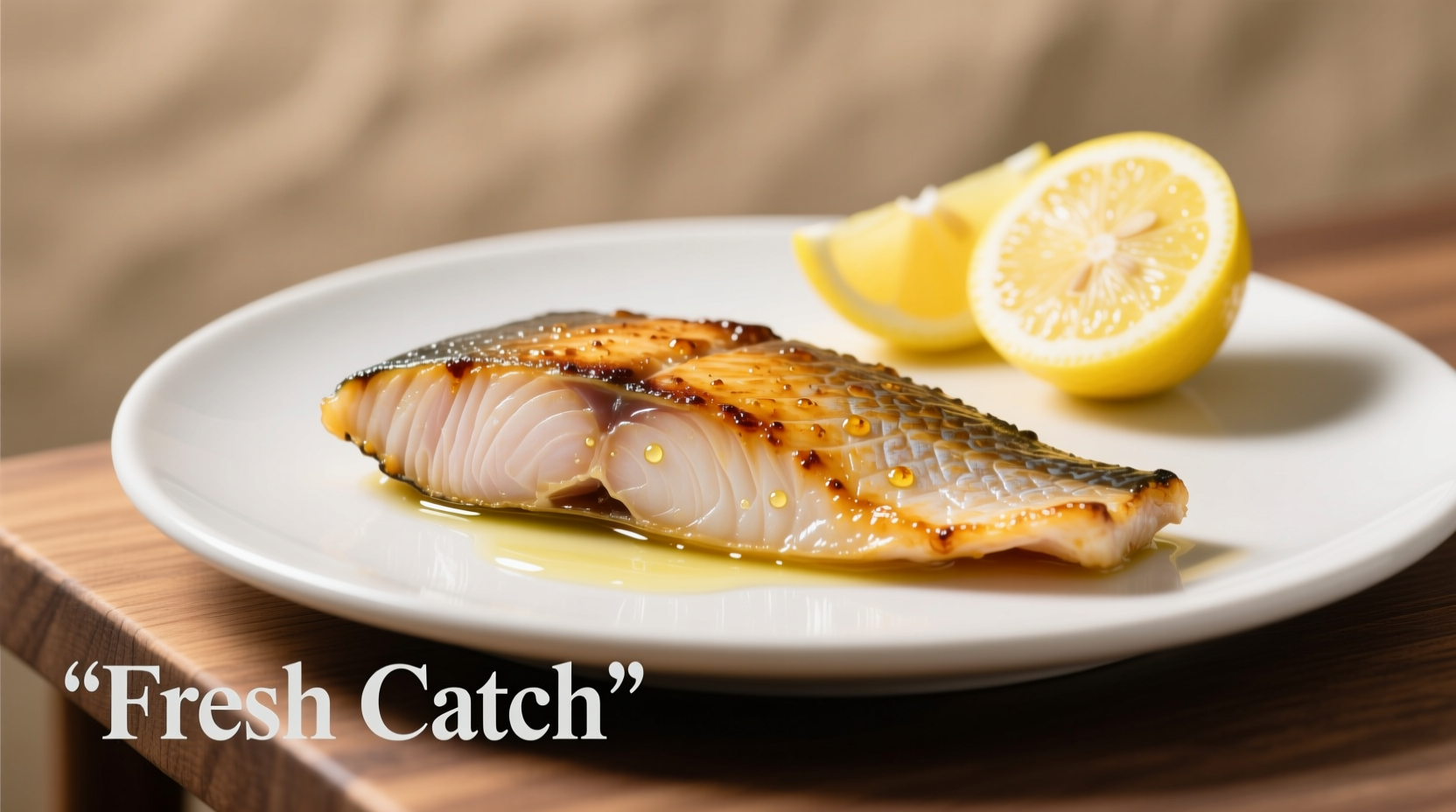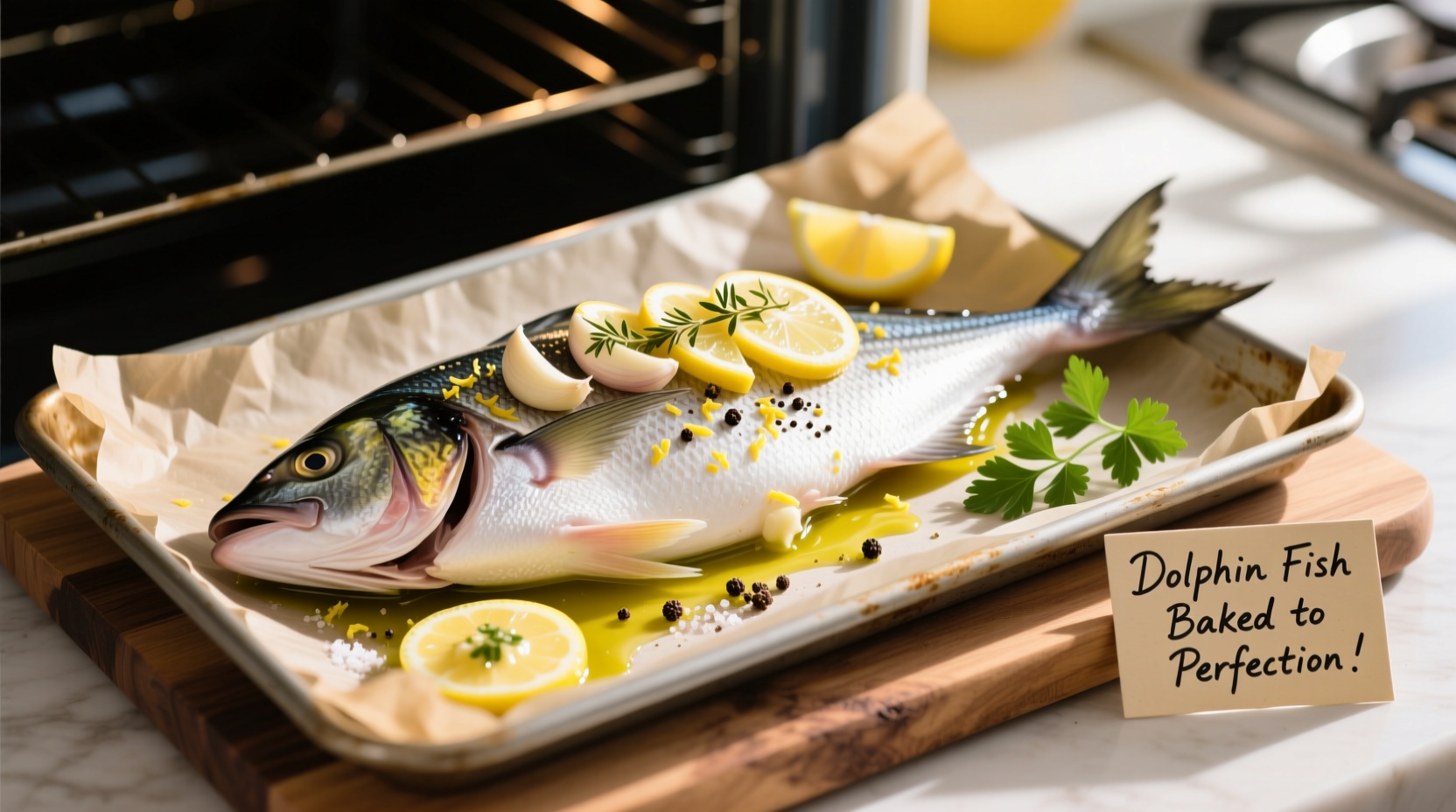Confusion about the term "dolphin fish" causes understandable concern. What many call dolphin fish is actually mahi-mahi (Coryphaena hippurus), also known as dorado—a vibrant, sustainable ocean fish completely unrelated to marine mammals. Actual dolphins are protected species and cannot be legally harvested for food in most countries. This guide focuses exclusively on cooking mahi-mahi, a popular and responsibly managed seafood choice.
Why Oven Cooking Works Best for Mahi-Mahi
Mahi-mahi's firm texture and mild, sweet flavor make it ideal for oven preparation. Unlike delicate fish that fall apart, mahi-mahi holds its structure while absorbing flavors beautifully. The oven's consistent heat ensures even cooking without the risk of overcooking that often happens with pan-searing.
| Mahi-Mahi Facts | Actual Dolphins |
|---|---|
| Scientific name: Coryphaena hippurus | Marine mammals (toothed whales) |
| Edible fish species, commonly harvested | Protected by international law |
| Sustainable when responsibly sourced | Illegal to catch or sell in most countries |
| Distinctive golden-green color when alive | Gray to black skin tones |
Source: NOAA Fisheries Species Directory
Essential Preparation Steps
Before you start cooking dolphin fish in oven, proper preparation ensures optimal results:
- Select quality fish: Look for firm, moist fillets with no fishy odor (should smell like the ocean)
- Thickness matters: Aim for 1-1.5 inch thick portions for even cooking
- Dry thoroughly: Pat fillets completely dry with paper towels to ensure proper searing
- Temperature check: Let fish sit at room temperature for 15 minutes before cooking
Step-by-Step Oven Cooking Method
1. Preheat and Prepare
Preheat your oven to 400°F (200°C). Line a baking sheet with parchment paper or lightly oil a glass baking dish. Higher temperatures create beautiful caramelization while keeping the interior moist.
2. Seasoning Application
Create a simple but flavorful seasoning blend:
- 1 tablespoon olive oil
- 1 teaspoon garlic powder
- 1/2 teaspoon smoked paprika
- 1/4 teaspoon cayenne (optional for heat)
- Salt and freshly ground black pepper to taste
Mix ingredients and rub evenly over both sides of the fish. For best results when learning how to cook dolphin fish in oven, avoid heavy marinades that can break down the delicate flesh.
3. Perfect Baking Technique
Place seasoned fillets on the prepared baking sheet. For optimal results when baking dolphin fish:
- Cook for 10-15 minutes (depending on thickness)
- Do not flip during cooking
- Check temperature at 10 minutes using an instant-read thermometer
- Remove when internal temperature reaches 145°F (63°C)

4. Resting and Serving
Let the fish rest for 5 minutes after removing from the oven. This allows proteins to relax and juices to redistribute. Serve with fresh lemon wedges and your choice of sides.
How to Tell When Dolphin Fish Is Perfectly Cooked
Understanding doneness indicators prevents overcooking, the most common mistake when learning how to cook dolphin fish in oven:
- Temperature: 145°F (63°C) at the thickest part (FDA recommendation)
- Texture: Flakes easily with a fork but remains moist
- Color: Changes from translucent to opaque white
- Time guideline: 10 minutes per inch of thickness
Overcooked mahi-mahi becomes dry and tough. Remember that cooking continues during resting, so remove the fish just before it reaches your desired doneness.
Serving Suggestions for Oven-Baked Mahi-Mahi
Complement your perfectly cooked dolphin fish with these pairing options:
- Citrus salsa: Mango, red onion, cilantro, and lime juice
- Vegetable sides: Roasted asparagus, grilled zucchini, or sautéed spinach
- Starch options: Coconut rice, quinoa pilaf, or roasted sweet potatoes
- Sauces: Light beurre blanc, herb-infused olive oil, or mango chutney
Troubleshooting Common Issues
Even when following the best method for how to cook dolphin fish in oven, problems can occur:
- Dry fish: Overcooking is the primary cause. Always use a thermometer and remove at 140°F (60°C) to account for carryover cooking.
- Sticking to pan: Ensure proper preheating of the baking surface and adequate oiling.
- Uneven cooking: Choose fillets of similar thickness or adjust cooking time for thicker portions.
- Bland flavor: Don't undersalt—fish needs more seasoning than you might expect.
Sustainability Considerations for Mahi-Mahi
When sourcing fish for your oven cooking project, sustainability matters. According to the FDA Seafood Guidelines, mahi-mahi is generally considered a "best choice" when responsibly harvested. Look for certifications like MSC (Marine Stewardship Council) or ask your fishmonger about the source. Avoid fish caught with methods that harm marine ecosystems.
Advanced Techniques for Perfect Results
Once you've mastered the basic method for how to cook dolphin fish in oven, try these professional enhancements:
- Brining: Soak in 1/4 cup salt dissolved in 4 cups water for 20 minutes before cooking for extra moisture retention
- Herb crust: Press fresh herbs like thyme or rosemary onto the surface before baking
- Citrus infusion: Place lemon or orange slices underneath and on top of the fish during cooking
- Temperature precision: For restaurant-quality results, cook at 375°F (190°C) for 15-18 minutes
Why This Method Works Best
The oven method for cooking mahi-mahi provides consistent results that other techniques struggle to match. Unlike grilling (which requires precise timing) or pan-searing (which risks uneven cooking), the oven's ambient heat ensures the entire fillet cooks evenly. This approach is particularly valuable for beginners learning how to cook dolphin fish in oven, as it offers a larger margin for error while still delivering professional results.
Frequently Asked Questions
Can I cook frozen mahi-mahi directly in the oven?
While possible, thawing first yields significantly better results. For best texture when cooking frozen dolphin fish in oven, thaw overnight in the refrigerator. If pressed for time, place the sealed fish in cold water for 30-60 minutes until fully thawed.
What's the ideal oven temperature for cooking mahi-mahi?
400°F (200°C) provides the perfect balance between surface browning and gentle interior cooking. Lower temperatures (325°F/160°C) work for thicker cuts but increase the risk of drying out thinner fillets.
How do I prevent my dolphin fish from drying out in the oven?
Three key techniques prevent dryness: 1) Don't overcook (remove at 140°F/60°C), 2) Keep the skin on if possible, and 3) Baste occasionally with olive oil or a light citrus mixture during cooking.
Can I use this method for other fish species?
Yes! This oven technique works well for any firm-fleshed fish like halibut, swordfish, or sea bass. Adjust cooking times based on thickness—delicate fish like cod or tilapia require lower temperatures and shorter cooking times.
Is mahi-mahi high in mercury?
According to the FDA mercury guidelines, mahi-mahi contains moderate mercury levels. The FDA recommends 1-2 servings per week for adults and smaller portions for children and pregnant women.











 浙公网安备
33010002000092号
浙公网安备
33010002000092号 浙B2-20120091-4
浙B2-20120091-4